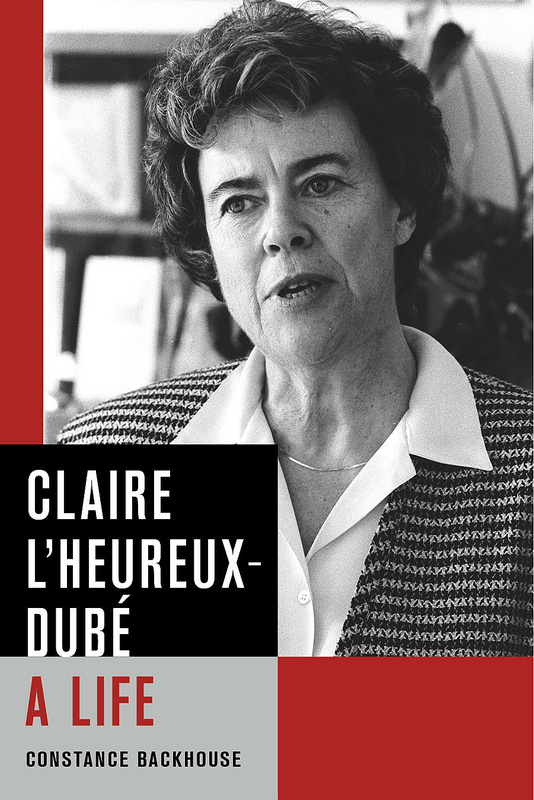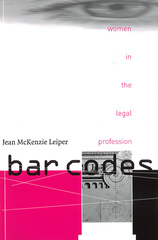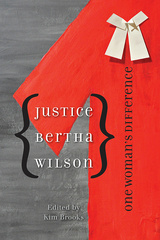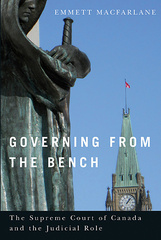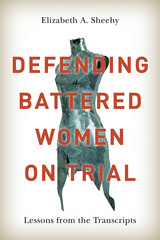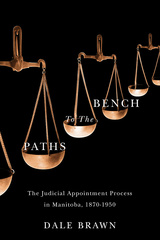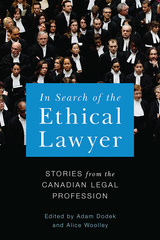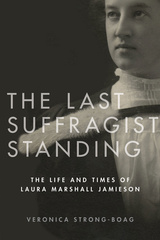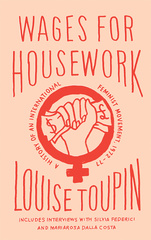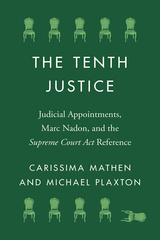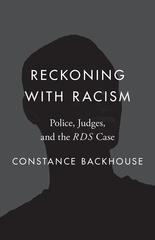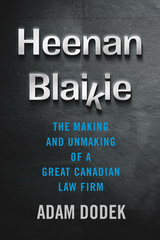Our shopping cart is currently down. To place an order, please contact our distributor, UTP Distribution, directly at utpbooks@utpress.utoronto.ca.
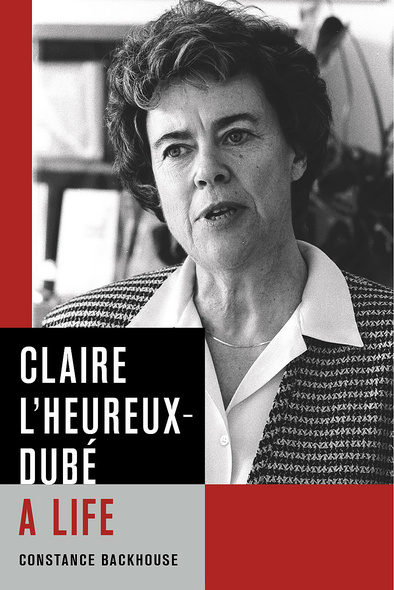
Both lionized and vilified, Claire L’Heureux-Dubé has shaped the Canadian legal landscape – and in particular its highest court. The second woman appointed to the Supreme Court, and the first Québécoise, she was known as “the great dissenter,” making judgments that were applauded and criticized in turn.
Who was this energetic, risk-taking woman? L’Heureux-Dubé stands out as one of the most dynamic and controversial judges on a controversial court. Did she consciously position herself for success in a discriminatory milieu, or was she oblivious to power?
L’Heureux-Dubé anchored her innovative legal approach to cases in their social, economic, and political context. Constance Backhouse employs a similar tactic. Rather than focusing exclusively on jurisprudential legacy, she explores the rich sociopolitical and cultural setting in which L’Heureux-Dubé’s career unfolded, while also considering her personal life.
This compelling biography covers aspects of legal history that have never been so fully investigated. Changing gender norms are traced through the experience of a francophone woman within the male-dominated Quebec legal profession – and within the primarily anglophone world of the Supreme Court. Claire L’Heureux-Dubé enhances our understanding of the Canadian judiciary, the creation of law, the Quebec socio-legal environment, and the nation’s top court.
Claire L’Heureux-Dubé will interest students and scholars of law, Canadian and Quebec history, and women’s studies, as well as legal professionals such as lawyers, judges, and law clerks. More generally, those who enjoy Canadian biography will find compelling reading in this study of a highly influential woman with a formidable legal intellect.
Awards
- 2018, Winner - CLSA Book Prize, Canadian Law and Society Association
- 2019, Shortlisted - Canada Prize in the Humanities and Social Sciences, Federation for the Humanities and Social Sciences
- 2018, Shortlisted - City of Ottawa Book Award
[Claire L’HeureuxDubé: A Life] is an exceptional contribution to Canadian legal literature. Backhouse completely immersed herself in her subject by taking extensive French immersion studies, learning about the Quebec civil law system, and conducting close to 200 interviews over a ten-year period … the result is a meticulously researched but very readable biography of a leading figure in Quebec and Canadian law.
Professor Backhouse has taken her legal expertise, stirred in prodigious amounts of research, added some spicy feminist analysis, iced the whole with her inimitable writing style, and served up a magnificent biography. For many English Canadians this detailed portrait will be an eye-opener, one that may well contribute to a greater understanding of Quebec history and culture through its comprehensive, intimate, and insightful portrait of Claire L’Heureux-Dubé herself. This book is a triumph.
This book is a tour de force. Constance Backhouse has created a new genre, one that masterfully combines socio-legal history and riveting biography, giving insight not just into the life of an individual but also into Canadian history. In its weaving together of public and private events, this book makes visible the costs borne by those who were breaking paths ahead of their time.
This is a biography of one of Canada’s most fascinating Supreme Court justices, written by one of Canada’s most accomplished authors. It is beautiful, brilliant, transparent, subtle, and honest.
A compelling book about a compelling judge by a compelling author. Claire L’Heureux Dubé is a bold, brilliant, and brave woman who transformed Canadian law. Constance Backhouse is also a bold, brilliant, and brave woman who has transformed Canadian legal history. This is a meeting between two giants, the ebullient and forceful Québec legal mind and the eminent Anglo-Canadian feminist scholar. I laughed, I cried, I debated, and I reflected. I read it in two days. So should you.
Constance Backhouse holds a Distinguished University Chair and a University Research Chair in the Faculty of Law at the University of Ottawa. Among her many books are Carnal Crimes: Sexual Assault Law in Canada, 1900–1975 (2008); The Heiress vs the Establishment: Mrs. Campbell’s Campaign for Legal Justice (2004; with Nancy L. Backhouse); Colour-Coded: A Legal History of Racism in Canada, 1900–1950 (1999); and Petticoats and Prejudice: Women and Law in Nineteenth-Century Canada (1991). Professor Backhouse has received the Augusta Stowe-Gullen Medal (1981), the J. Willard Hurst Prize (1992), the Law Society Medal (1998), a Bora Laskin National Fellowship in Human Rights Research (1999), a Pierre Elliott Trudeau Foundation Fellowship (2006), the Ramon John Hnatyshyn Award for Law (2006), the Killam Prize (2008), the Governor General’s Award in Commemoration of the Persons Case (2013), and the Molson Prize (2015). She was made a Fellow of the Royal Society of Canada in 2004 and was named to the Order of Canada in 2008 and the Order of Ontario in 2010.
Foreword
Chronology
Introduction
1 Ewanchuk
Family Heritage and Childhood
2 Lineage: Of Elephants, Literary Salons, the Military, and Mozart
3 Early Years: Quebec City and Rimouski
4 Growing Up in Rimouski
Early Education
5 Life as a Pensionnaire with the Ursulines, 1937–43
6 Collège Notre-Dame-de-Bellevue: Classical Studies for a Baccalauréat, 1943–46
A Legal Education
7 The Decision to Go to Law School, 1946–48
8 Laval Law School Student Body, 1948–52
9 Laval Law School Faculty and Curriculum, 1948–52
10 Life Outside of Law School, 1949–52
Law Practice
11 Entry: A Law Firm Job, 1952
12 Sam Bard: The Man behind the Employment Offer
13 Business Law Practice
14 Marriage and Children
15 Family Law: The Later Years of Practice
16 Practising as a Woman
Quebec Superior Court
17 New Career Directions: “No” to Electoral Politics, “Yes” to the Bench, 1972–73
18 First Months on the Bench, February to October 1973
19 Immigration Commission of Inquiry, October 1973 to January 1976
20 Quebec Superior Court, 1976–79
21 Family Tragedy: Arthur’s Death, 11 July 1978
Quebec Court of Appeal
22 Appointment to the Quebec Court of Appeal, 1979
23 Appellate Judging, 1979–87
24 More Family Traumas
Supreme Court of Canada
25 Appointment to the Supreme Court of Canada, 1987
26 Early Days on the Supreme Court of Canada
27 Continuing Isolation on the Supreme Court
28 Fifteen Years of Jurisprudence, 1987–2002: “The Great Dissenter”
Selected Cases
29 Sexual Assault: Seaboyer, 1991
30 Family Law and Spousal Support: Moge, 1992
31 Human Rights for Same-Sex Couples: Mossop, 1993
32 Tax Law and Sex Discrimination: Symes, 1993
33 More Deaths, 1987–94
34 The Quebec Secession Reference: “The Most Important Case,” 1998
35 Fairness in Immigration Law: Baker, 1999
36 Epilogue on Ewanchuk
A Wider Stage
37 Judicial Education and International Influence
38 Retirement: A Much Heralded Exit
Conclusion
Notes
Index

